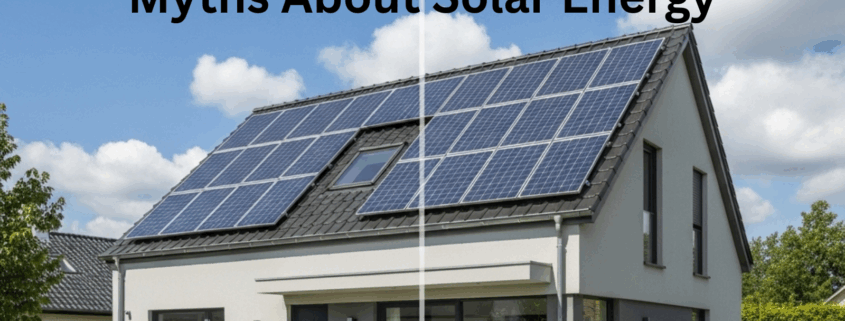Debunking the Top 10 Myths About Solar Energy
When it comes to switching to clean energy, solar power is often surrounded by myths and misconceptions. These myths can prevent homeowners and businesses from making smart, eco-friendly decisions. Today, we’re setting the record straight by debunking the top 10 myths about solar energy.
Myth 1: Solar Panels Don’t Work on Cloudy Days
Truth: Modern solar panels are more efficient than ever. While production does drop on cloudy days, panels still generate electricity thanks to diffuse sunlight. Germany, which gets less sunlight than many countries, is a global leader in solar energy adoption.
Myth 2: Solar Energy is Too Expensive
Truth: The cost of solar panels has dropped over 80% in the last decade. With government incentives, tax credits, and financing options, going solar is more affordable than you think — and the long-term savings on your energy bills can be substantial.
Myth 3: Solar Panels Require Constant Maintenance
Truth: Solar panels are designed to withstand the elements. They require minimal maintenance — just occasional cleaning and a professional check-up every few years to ensure optimal performance.
Myth 4: Solar Panels Will Damage My Roof
Truth: When installed by certified professionals, solar panels can actually protect your roof from the elements and extend its lifespan. Installers use mounting systems that do not compromise the structural integrity of your roof.
Myth 5: Solar Energy Can’t Power a Home at Night
Truth: It’s true that solar panels don’t produce energy at night, but battery storage solutions and net metering programs allow you to store or draw energy when the sun isn’t shining. Many households run smoothly on solar day and night.
Myth 6: Solar Panels Don’t Work in Cold Climates
Truth: Solar panels actually perform better in cooler temperatures. Snow can even help by reflecting more sunlight onto panels. Many cold-climate regions, like parts of Canada and the Northern US, benefit greatly from solar.
Myth 7: Solar Will Make My Home Look Ugly
Truth: Solar technology and aesthetics have come a long way. Sleek, low-profile panels and integrated solar shingles are designed to blend with your roof, adding a modern touch that many homeowners find attractive.
Myth 8: Solar Panels Decrease Property Value
Truth: Multiple studies show that solar panels can actually increase property value. Homebuyers appreciate lower utility bills and energy independence, making solar-equipped homes more attractive in the real estate market.
Myth 9: I Won’t Live in My Home Long Enough to See Savings
Truth: Many homeowners recoup their investment in solar within 5–8 years, and homes with solar often sell faster and at higher prices. Even if you move, you could see a return on your solar investment.
Myth 10: Solar Energy Alone Can’t Make a Difference
Truth: Every solar installation reduces reliance on fossil fuels, cuts carbon emissions, and contributes to a more sustainable future. Millions of small actions add up — and solar energy is a crucial part of the global clean energy transition.
Frequently Asked Questions (FAQs) About Solar Energy Myths
✅ Do solar panels work during a power outage?
Most standard grid-tied solar systems shut down during a power outage to protect utility workers. However, if you have a battery backup or an off-grid system, you can still use your solar power when the grid goes down.
✅ Is it true that solar panels lose efficiency over time?
Yes, but only slightly. Most high-quality solar panels lose about 0.5% of efficiency per year, which means they still operate at about 85–90% capacity after 20–25 years.
✅ Are solar incentives and tax credits still available?
Yes! Many countries, states, and local governments offer tax credits, rebates, or net metering programs to make solar more affordable. Always check current local incentives when planning your installation.
✅ Can I install solar panels myself?
DIY solar is possible for experienced homeowners, but it’s best to hire certified professionals to ensure proper installation, warranty coverage, and compliance with local building codes.
✅ How do I know if my roof is suitable for solar panels?
A solar professional can assess your roof’s age, orientation, shading, and structure. Ideally, a roof should face south (in the northern hemisphere) with minimal shading for maximum efficiency.
✅ Is solar energy really environmentally friendly?
Absolutely. Solar energy produces zero emissions during operation, significantly reduces your carbon footprint, and requires minimal resources compared to fossil fuels.
Final Thoughts
Don’t let outdated myths about solar energy hold you back. With modern technology, favorable incentives, and proven benefits, there’s never been a better time to switch to solar. Have more questions? Reach out to a trusted solar professional and see how clean, affordable energy can work for you.
Ready to Go Solar?Are you considering solar energy for your home or business? Contact a local installer today and take the first step toward energy independence and a greener future.


